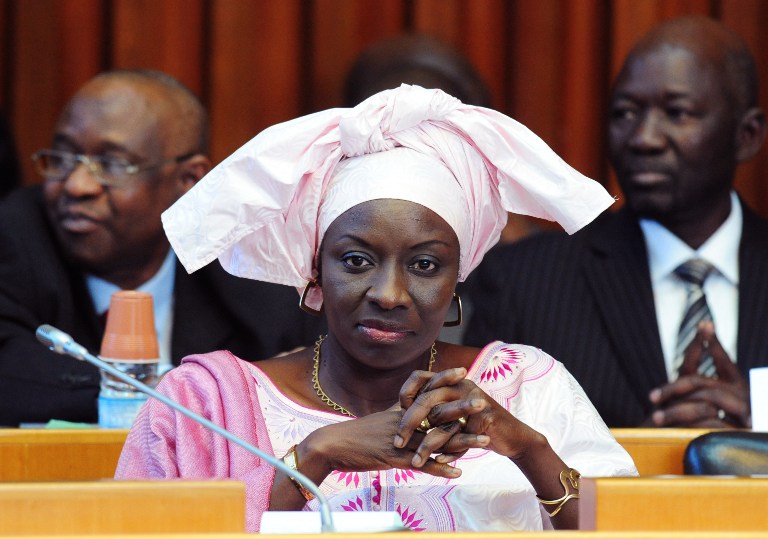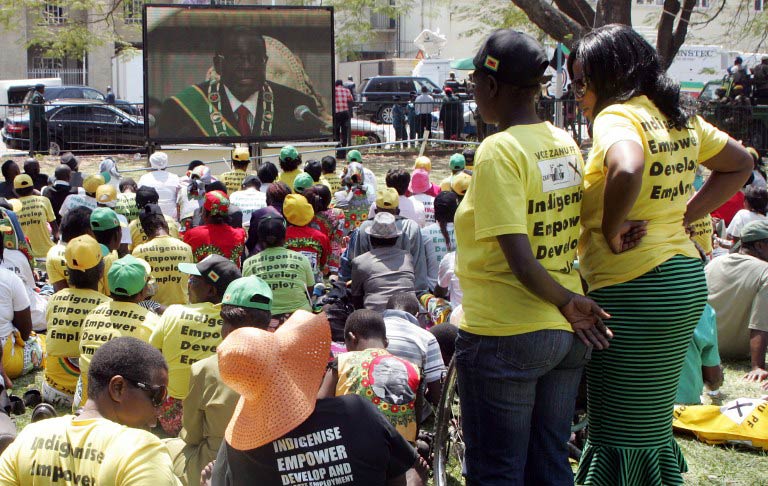I recently visited a primary school in my neighbourhood to run an errand. It was break time when I arrived and the chorus of children’s excited voices had reached its crescendo. As I made my way to the office that I was looking for, I was confronted by emotions that I have become used to feeling each time I enter a government institution: shock at the levels of dilapidation of infrastructure and frustration at the seeming lack of interest in improving it.
As I walked down the concrete pathway, I looked over to the school’s sports field where thick clouds of dust erupted continuously as hoards of children played football.
There used to be a green and fertile lawn on those grounds once.
A Cabinet of three women
Upon stopping to spectate, I began to notice a few other things about this match. Firstly, it wasn’t an 11-a-side affair – most informal games aren’t. In fact, I don’t believe there were even sides to begin with, seeing as there were at least 40 children on the turf scrambling for the ball. But secondly, and this more interesting to me, there was a sizeable group of girls sitting in the bleachers half watching the encounter and half engaged in their own conversations.
There were no boys in the bleachers, just as there were no girls on the pitch.
Again, there isn’t much that’s new about this scenario; it plays itself out in schools everywhere. But I began to think about it from a more pointed perspective.
A few weeks ago, Zimbabwe’s Cabinet was announced. Of the 26 ministers appointed, only three are women. This represents an 11.5% female proportion – a figure significantly lower than the 50/50 threshold aspired for by 2015 through the SADC Protocol on Gender and Development. Furthermore, the announcement came at a time when Senegal had just elected feminist leader Aminata Touré as Prime Minister and Rwanda’s Parliament had recorded an unprecedented 64% representation for women in the Chamber of Deputies. While the main focus of Zimbabwe’s new Cabinet has largely been the reinstatement of an old Zanu-PF guard (with the MDC no longer a part of power-sharing), the retrogression of female political participation calls for some expedient action and analysis.

As women took to social media to protest, there was a very clear voice from the men – “Well, who did you want them to put?” – as if a defence of turf and territory had erupted within them.
In many ways, I feel that the soccer field scenario yields some of the answers to Zimbabwe’s present female leadership and participation dilemma.
‘Rough’ pursuits are for the boys
Why do the little girls not play football with the boys?
My first response is to say that they – just as the boys who do play – have been socialised to believe that football and other ‘rough’ pursuits are for boys. Girls are supposed to be dainty and pristine in a system that is preparing them for marriage and motherhood.
There is nothing new in this analysis and we know that it generally means that the little girl who wants to play football – or the little boy who wants to sit and talk – each face an incredible amount of pressure to conform to prescribed gendered roles and expectations. Their peers will tease them if they do not; even their teachers and parents might join in.
And with crazed amounts of homophobia in Zimbabwe, anything that sits outside the bounds of ‘normality’ is deeply chastised. I recall once overhearing a father tell his son not to touch or play with his sister’s pink teddy bear because he would “become gay”. The boy, just five, was obviously puzzled. But therein had begun his socialisation around the colour pink, teddy bears and sexuality.
But I also began to look at the football scene from a practical perspective. The playground was dusty and the boys’ uniforms were getting filthy. While already an accepted consequence of ‘playing rough’, there is another layer to the matter.
From what I have observed, most boys do not do their own laundry; a maid or mother or sister or aunt takes care of this chore, leaving the male child free to soil and damage his clothes as much as wants to. Someone else will take care of the mess.
But the same is not usually so for the girls who, in efforts towards entrenching domesticity (or is it independence?), are washing their own clothes long before puberty hits. So playing football with the boys has a few more ramifications than mere social stigma; playing football means getting dirty, and then having to clean the mess up yourself. Put simply, it means extra work. Even if the girls did start to play, they might play with a bit more caution and attention to dirtiness.
So what could, or would, happen if the school I visited decided to invest in growing back its lawn? Could a change in at least some of the girls’ behaviour be seen? Could such a structural modification challenge the socially driven aspects of their action, or inaction?

If we change the arena, we may draw a few parallels. Just like football, politics is a dirty game. And the dirtier a woman gets, the more she has to ‘clean herself up’ while facing social stigma for her stance. Furthermore, if a girl is not opened up to the possibility of parity and full participation in her childhood, we shouldn’t expect to magically see this manifest in her when she’s a woman. Even the portfolios that Zimbabwe’s female ministers hold are telling of the positions that are deemed appropriate for a woman: Women’s Affairs (Oppah Muchinguri), Small and Medium Enterprises (Sithembiso Nyoni), Higher and Tertiary Education (Olivia Muchena). Unlike finance or ICT portfolios, these are women’s ‘normalised’ roles, like sitting in the bleachers.
I do not write this to exonerate President Robert Mugabe from blame for his heavily imbalanced Cabinet. But I do write it to make clear to the men who have dismissed women’s protests that they do so from a privileged position in society where all arenas, no matter how dirty, are normalised to their needs and aspirations.
Zimbabwean society needs a social and structural shakeup for women and girls to begin to get somewhere. And this starts with the seemingly small acts that take place during tea and lunch breaks in school yards. Those girls in the bleachers hold some of the solution, as do we, their mothers, sisters, aunts and elders.
Fungai Machirori is a blogger, editor, poet and researcher. She runs Zimbabwe’s first web-based platform for women, Her Zimbabwe, and is an advocate for using social media for consciousness-building among Zimbabweans. Connect with her on Twitter.
This post was first published on Her Zimbabwe.

Comments are closed.